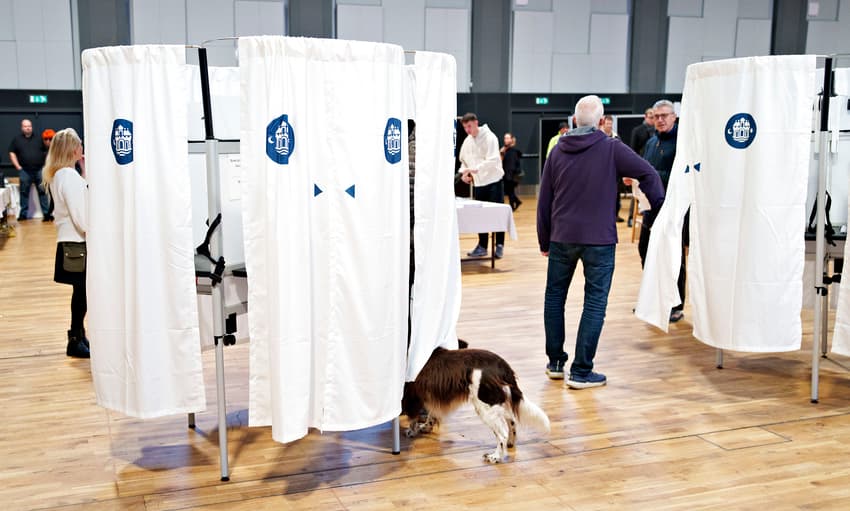EXPLAINED: What happens on Denmark's election day and when do we get a result?

Millions of people in Denmark go to the polls today to decide on a new government but what exactly happens on election day? We run through the main events.
8am: Polling stations open. Voter turnout is traditionally high in Denmark. In the 2019 election, 84.6 percent of some 4.2 million voters turned out to vote. Over 3.5 million people are expected to vote today.
6.50pm: Broadcaster DR will announce its first exit poll based on interviews with voters shortly after they have left polling booths.
8pm: Polling stations close and then counting of votes begins. If you arrive at 8pm and there is a queue, you will still be able to vote.
8pm: Exit polls are released and discussed by Danish television broadcasters DR and TV2. These are based on interviews with voters shortly after they have left polling booths.
9.25pm: First results announced. It will be possible to make a fairly firm indication of the overall outcome. Party leaders are called together for a comment when they have all arrived in Christiansborg and spoken to their party colleagues.
12am: The final results are expected to be submitted shortly after midnight. At the election in 2019, the results were ready at 12.14am.
According to latest opinion polls on Tuesday morning, neither the right-wing blue bloc nor left-wing red bloc look set to gain a majority. It is the Moderates, who are predicted to hold the decisive mandates - a centrist party founded this year by former Liberal Party leader and two-time prime minister Lars Løkke Rasmussen.
If the opinion polls are correct, then this evening's results will not tell us how the new government will be formed or who the Prime Minister will be. The Moderates have not yet said who they want as Prime Minister after the election. This will all be negotiated over the coming days and weeks.
A new Prime Minister is elected through a process known as a dronningerunde (literally a ‘Queen’s round’). Here, the leader of each party has an audience with the Queen. After this, the Queen nominates a person to lead the new government or lead negotiations to form it. Sometimes several queen rounds are needed before a new government can be formed, which some have predicted will happen this year.
Comments
See Also
8am: Polling stations open. Voter turnout is traditionally high in Denmark. In the 2019 election, 84.6 percent of some 4.2 million voters turned out to vote. Over 3.5 million people are expected to vote today.
6.50pm: Broadcaster DR will announce its first exit poll based on interviews with voters shortly after they have left polling booths.
8pm: Polling stations close and then counting of votes begins. If you arrive at 8pm and there is a queue, you will still be able to vote.
8pm: Exit polls are released and discussed by Danish television broadcasters DR and TV2. These are based on interviews with voters shortly after they have left polling booths.
9.25pm: First results announced. It will be possible to make a fairly firm indication of the overall outcome. Party leaders are called together for a comment when they have all arrived in Christiansborg and spoken to their party colleagues.
12am: The final results are expected to be submitted shortly after midnight. At the election in 2019, the results were ready at 12.14am.
According to latest opinion polls on Tuesday morning, neither the right-wing blue bloc nor left-wing red bloc look set to gain a majority. It is the Moderates, who are predicted to hold the decisive mandates - a centrist party founded this year by former Liberal Party leader and two-time prime minister Lars Løkke Rasmussen.
If the opinion polls are correct, then this evening's results will not tell us how the new government will be formed or who the Prime Minister will be. The Moderates have not yet said who they want as Prime Minister after the election. This will all be negotiated over the coming days and weeks.
A new Prime Minister is elected through a process known as a dronningerunde (literally a ‘Queen’s round’). Here, the leader of each party has an audience with the Queen. After this, the Queen nominates a person to lead the new government or lead negotiations to form it. Sometimes several queen rounds are needed before a new government can be formed, which some have predicted will happen this year.
Join the conversation in our comments section below. Share your own views and experience and if you have a question or suggestion for our journalists then email us at [email protected].
Please keep comments civil, constructive and on topic – and make sure to read our terms of use before getting involved.
Please log in here to leave a comment.